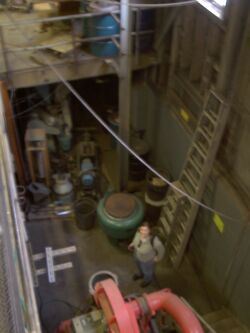|
Journal: The Eye Bank
University of Toronto - Best Institute and the Eye Bank by Liz (February 2002): From the ground level of the Toronto General Hospital, we decided to check out a tunnel we'd visited before
that shoots off of the first floor College wing. This tunnel is marked by a
set of green doors on either end, but the first time we tried them, the
doors were locked on the far end. This time they were not. We entered a
building we had not explored before — a startling bright green and
black-and-white place with all kinds of neat woodwork and strange extinct
medical-style equipment. We headed up a few storeys and found bizarre
mechanical rooms and abandoned filing cabinets naming diseases we'd never
heard of. Boxes of slides with urine specimens lay atop cabinets in
seemingly-abandoned hallways. What a strange part of the hospital, we
thought.
Up on the top level, we found a few signs of life — animal testing
facilities with keycarded doors and unfriendly signs. One level further up
Ninj found a nice ladder to an elevator room, but I was too hot to do any
more climbing. (It is a universal rule of institutions that on the first
warm day of the year, they will not adjust their thermostats from the "hot
as can be" setting, even if it means the whole building is 342347999991
degrees).
On our way back down to ground level, we paused to look out a window in one
of the stairwells.
"Hey," I said, "Where exactly are we?"
Ninj joined me in looking outside, both of us perplexed as to why the
street we were looking at was none of the four that border Toronto General
Hospital.
"Uh...I think we crossed the street," Ninj said. We had. That tunnel at the
beginning? It led under College street over to the University of Toronto.
We weren't in the hospital at all! No wonder we'd never explored this wing.
Oops.
On our way back home from the hospital, we decided after many years of
ignorance that we ought to know what was inside One Spadina Crescent. This
building, owned by the University of Toronto, is the large, looming
structure that sits in the middle of Spadina roughly between College and
Bloor streets. While our friend Kate had previously advised us that this
building was "creepy" and contained some sort of medical eye laboratory, we
were quickly distracted by the shoddy interior and wide-open doors to just
about anywhere.
 We speedily found our way to a large room marked "storage". This room, at
the north end of the building, contained numerous bizarre, brightly
coloured machines, and three storeys of barrels. Walking up a metal
staircase to take a closer look at this barrel paradise, we noticed massive
cobwebs — I guess the barrel-watchman isn't on duty more than once a year.
I was having fun looking around and taking pictures when I realized many of
the barrels (all unmarked) were uncovered and seemed to contain differing
stages of mysterious and disgusting slime. I suggested it was time to go
rather than keep hanging out with the toxic waste, and so we headed out,
just about bumping into a security guard the minute we left the room. Only
he wasn't a security guard. He just worked for the parking authority. But
it seemed like a close one at the time.
We speedily found our way to a large room marked "storage". This room, at
the north end of the building, contained numerous bizarre, brightly
coloured machines, and three storeys of barrels. Walking up a metal
staircase to take a closer look at this barrel paradise, we noticed massive
cobwebs — I guess the barrel-watchman isn't on duty more than once a year.
I was having fun looking around and taking pictures when I realized many of
the barrels (all unmarked) were uncovered and seemed to contain differing
stages of mysterious and disgusting slime. I suggested it was time to go
rather than keep hanging out with the toxic waste, and so we headed out,
just about bumping into a security guard the minute we left the room. Only
he wasn't a security guard. He just worked for the parking authority. But
it seemed like a close one at the time.
What I didn't find out until later is that 1 Spadina Crescent actually
houses a massive eye bank — that's right, a repository for hundreds if
not thousands of disembodied eyeballs. It was also the site of the murder
of U of T Art History professor David Buller last year. Buller was stabbed
to death in his office in the middle of a weekday — the killer remains at
large. It was speculated at the time that the building was an unsafe place
to spend time, as there were so many hiding places for crazed homeless
psycho killers. (While it seems more likely that Buller was killed for
being a controversial gay artist, the building is still disturbing by its
own rights.)
Continue Back in Journal | Switch to Journal Index
|

